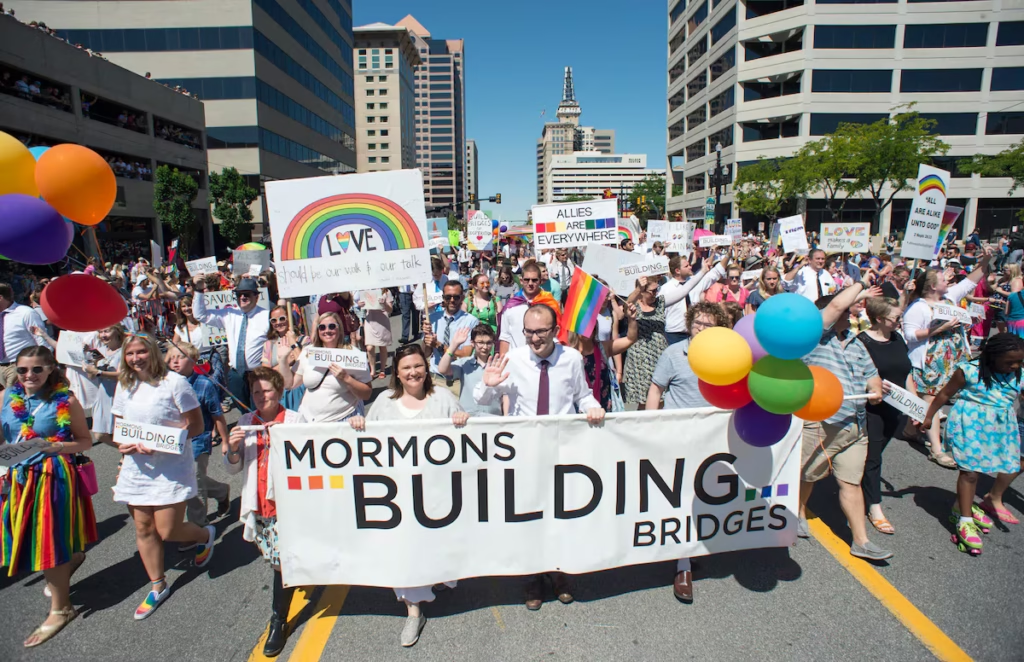The Disheartening Theft of Pride Flags from SLC’s Pioneering LGBTQ-Affirming Church

SLC's Pioneering LGBTQ-Affirming Church
Introduction: A Community’s Symbol of Pride
Pride flags hold profound significance within the LGBTQ+ community, serving as powerful representations of identity, resilience, and solidarity. The rainbow flag, originally designed in 1978 by artist Gilbert Baker, encapsulates a spectrum of identities and represents the diversity within the community, encompassing various sexual orientations, gender identities, and expressions. Over the years, pride flags have evolved into symbols of acceptance and empowerment, creating spaces where individuals can proudly express their authentic selves.
In Salt Lake City, one of the notable pillars of support for the LGBTQ+ community is the city’s first LGBTQ-affirming church. This place of worship, committed to inclusivity and acceptance, prominently displays pride flags as a testament to its dedicated mission. The presence of these flags not only visualizes the church’s commitment to fostering a welcoming environment but also signals to the broader community an opportunity for dialogue and understanding. Congregants often describe the flags as a beacon of hope, illuminating the journey towards equality and acceptance for individuals who may have experienced ostracism.
However, the symbolic significance of pride flags transcends their mere existence in the physical realm; they serve as reminders of the struggles faced by the LGBTQ+ community. The recent incident involving the theft of these flags from the church underscores a disheartening reality. Not only does this act diminish the visual representation of pride within the community, but it also stirs deep emotional responses among congregants and supporters alike. The flags were not just decorations; they embodied the values of love, acceptance, and unwavering support. This act of theft therefore resonates far beyond the loss of physical items, reverberating throughout the community and emphasizing the challenges that still lie ahead in the pursuit of equality and respect for all individuals.
Background: The History of the Church
The LGBTQ-affirming church in Salt Lake City, founded in the early 2000s, emerged as a response to the growing need for inclusive spiritual spaces within the community. Its founding mission was rooted in the desire to create an environment where individuals could honor their identities without fear of discrimination or exclusion. This church’s establishment reflected a significant shift in religious attitudes toward the LGBTQ community, especially in a region historically known for its conservative values.
From the outset, the church positioned itself as a sanctuary for LGBTQ individuals seeking fellowship, acceptance, and support. Over the years, it has played a crucial role in promoting LGBTQ rights and visibility, actively participating in local pride events and advocacy efforts. This commitment to championing equality has fostered a sense of belonging and empowerment, allowing congregants to unite in both worship and activism. Within this supportive environment, the church has encouraged its members to embrace their identities boldly and publicly.
As the church developed its identity, it became a beacon of hope and resilience amid societal challenges. Its leadership has consistently highlighted the significance of pride symbols, like flags, as representations of identity, community, and solidarity. These symbols not only celebrate diversity but also serve as reminders of the ongoing struggles faced by LGBTQ individuals. Throughout its journey, the church has ensured that its spaces remain welcoming and affirming while addressing the complex issues surrounding acceptance and love in a predominantly conservative setting.
This historical context illustrates how the church has transformed into a critical safe haven, enabling its members to thrive in the face of adversity. Through its unwavering dedication to inclusivity and social justice, the church has made an indelible impact on the Salt Lake City LGBTQ community, reminding us all of the power of faith to foster connection and empowerment.
The Incident: Details of the Theft
On a somber evening in late September 2023, the community of Salt Lake City witnessed a disheartening act of theft that targeted the pride flags displayed outside of the pioneering LGBTQ-affirming church. These flags, emblematic of inclusivity, acceptance, and pride, were crucial symbols for the congregation, reflecting their commitment to supporting the LGBTQ community. The incident occurred around 10 PM, just hours after the weekly spiritual gathering had concluded. Eyewitness accounts reveal that two individuals were seen lurking near the church, purposefully glancing around before they approached the brightly colored flags that adorned the entrance.
The perpetrators, described by witnesses as teenagers, swiftly snatched the flags from their poles and fled the scene on foot, leaving behind a stunned congregation that had dedicated their values to fostering a safe environment for all. The church leadership, alerted shortly after the theft, expressed deep disappointment and concern over the incident. In a statement following the event, the pastor mentioned, “These flags are not merely fabric; they signify our unwavering support for diversity and love. This act undermines what we stand for as a community.”
Members of the congregation were quick to share their shock and sadness, contributing to a growing conversation about the ongoing challenges faced by LGBTQ individuals in the region. Many congregants emphasized the importance of visibility, as these symbols serve as a reminder of their ongoing struggles and victories. The immediate aftermath of the theft resulted in a rallying of support from both within the congregation and the broader community, further reinforcing the commitment to reclaiming the space and upholding the values that these pride flags represent.
Community Reactions: Outrage and Support
The recent theft of pride flags from a pioneering LGBTQ-affirming church in Salt Lake City has elicited a profound sense of outrage and disappointment among both church members and the broader LGBTQ community. Many have expressed feelings of anger at the act, viewing it as not only a crime against property but also a direct assault on the values of acceptance and inclusivity that these flags represent. The pride flag has long been a symbol of hope and resilience, and its removal is seen as a significant loss for those who strive for equality and recognition.
Comments on social media platforms and local forums have echoed this sentiment, with community members articulating their dismay over what they perceive as an attack on their identity and dignity. Such responses reflect a collective acknowledgment that the removal of these symbols is more than a simple act of vandalism; it manifests a deeper societal struggle against homophobia and intolerance. The emotional impact of this theft has resonated particularly among LGBTQ youth, who may find their own struggles for acceptance reinforced by this negative incident.
The Importance of Pride Flags: Symbolism and Significance
Pride flags serve as powerful symbols within the LGBTQ community, representing not only identity but also the ongoing quest for acceptance and equality. Originally conceived in San Francisco in 1978 by artist Gilbert Baker, the pride flag has evolved into an emblem of diverse identities. Each color of the flag carries specific meanings that reflect the various dimensions of LGBTQ experiences. For instance, the original eight colors included pink for sex, red for life, orange for healing, yellow for sunlight, green for nature, turquoise for magic, blue for harmony, and violet for spirit. Over time, the flag has seen variations such as the six-color version, which continues to prominently influence pride celebrations worldwide.
The significance of pride flags extends beyond their colors; they embody the struggles faced by the LGBTQ community throughout history. The flag stands as a reminder of the hard-fought battles for rights and recognition, often in the face of discrimination and hostility. As such, pride flags act as a source of affirmation for individuals who may feel marginalized or invisible in society. They provide a sense of belonging and community, fostering an environment where individuals can express their identities freely and authentically.
Moreover, pride flags play an essential role in activism and advocacy. When displayed at events such as parades, rallies, and vigils, they signal solidarity, visibility, and support for LGBTQ rights. The act of displaying a pride flag has become a form of resistance against oppressive forces, serving to educate others and promote inclusivity. Thus, the theft of pride flags, especially from institutions like churches that affirm LGBTQ identities, signifies more than mere vandalism; it represents an affront to the values of acceptance and equality that these flags symbolize. Understanding the depth of meaning behind pride flags is crucial to grasping the impact of their loss on the community they represent.
Reactions from LGBTQ Activists and Allies
The recent theft of pride flags from Salt Lake City’s pioneering LGBTQ-affirming church has sparked a range of reactions from activists and allies within the community. Many local LGBTQ leaders have expressed their dismay, emphasizing that such actions are not merely vandalism; they represent a broader assault on the visibility and rights of LGBTQ individuals. Activist and community organizer Jamie Rodriguez stated, “This act of theft symbolizes a deeper intolerance and sends a message that our pride and identity are not welcome.” Such sentiments resonate deeply, as pride flags have long been symbols of hope, acceptance, and resilience.
Community leaders have underscored the impact of this incident on ongoing social justice efforts. It serves as a reminder of the challenges that still exist in the fight for equality. According to Sarah Klein, an LGBTQ rights advocate, “When symbols like the pride flag are disrespected, it affects not only those directly involved but also the collective morale of the community.” The sense of security and affirmation that pride flags provide becomes threatened, perpetuating feelings of vulnerability among individuals seeking acceptance.
The theft has also prompted discussions about the implications for public perception. Local activist Michael Thompson highlighted how these incidents can reinforce negative stereotypes about the community. “Acts of hate do not just hurt; they shape how society views LGBTQ individuals as a whole. It’s crucial that we respond with resilience and continued advocacy for our rights,” he remarked. In light of the theft, many activists are rallying support to ensure the community remains united in their fight for visibility and acceptance, emphasizing that while the theft is disheartening, it will not define the spirit or resolve of the LGBTQ community in Salt Lake City.
The Church’s Response: Actions Taken and Moving Forward
In light of the recent theft of pride flags from Salt Lake City’s pioneering LGBTQ-affirming church, the leadership team has voiced a strong commitment to uphold their values of inclusivity and community engagement. Upon discovering the incident, immediate steps were taken to not only address the loss but also to enhance the overall security of the premises. This includes reviewing existing surveillance measures and investing in a more robust security system, ensuring that the church symbolizes a safe haven for all individuals, regardless of their sexual orientation or gender identity.
To replace the stolen pride flags, the church has initiated a fundraising campaign that invites both congregants and community members to contribute to the purchase of new flags. This initiative not only aims to recover the lost symbols of pride but also serves as a reminder of the resilience of the LGBTQ community. The church plans to organize a community event, where members can gather, contribute, and participate in a collective flag-raising ceremony that will reaffirm their dedication to acceptance and love.
Moreover, the church intends to launch a series of educational workshops focusing on inclusivity, understanding, and dialogue. These workshops will aim to address the issues surrounding hate crimes and discrimination, fostering an environment where open discussion can take place. By inviting speakers from various backgrounds, the church hopes to further educate both its members and the broader community about the importance of tolerance and respect.
Ultimately, the church seeks to transform this disheartening incident into an opportunity for growth and healing. By reinforcing its commitment to inclusivity through practical actions and ongoing education, the church is determined to emerge stronger, ensuring that its mission will resonate even more profoundly within the community in the face of adversity.
The Broader Implications: Understanding Hate Crimes
The theft of pride flags from SLC’s pioneering LGBTQ-affirming church highlights a significant issue within society: hate crimes targeting the LGBTQ community. This incident is not an isolated act of vandalism, but rather part of a concerning national trend. According to recent statistics, the FBI has reported a persistent rise in hate crimes against LGBTQ individuals over the past decade. Such incidents reflect a broader societal problem, where negative attitudes towards LGBTQ identities may culminate in acts of violence and discrimination.
Understanding the motivations behind these hate crimes is paramount to addressing the issue effectively. Researchers have suggested that such acts often stem from deep-seated prejudice, fueled by a lack of understanding or acceptance of diverse sexual orientations and gender identities. The individuals committing these crimes may harbor feelings of fear or anger towards LGBTQ individuals, perceiving their identities as a threat to traditional societal norms. This irrational fear can manifest into aggressive behaviors, such as theft, vandalism, or physical violence.
Furthermore, societal attitudes play a crucial role in either fostering or combating an environment tolerant of hate crimes. In communities where LGBTQ individuals are stigmatized or marginalized, the likelihood of hate-fueled incidents increases. Conversely, when communities actively promote inclusion and respect for diversity, they create a safer environment for LGBTQ individuals to express their identities freely. Educational initiatives that challenge prejudicial beliefs and encourage dialogue about LGBTQ issues are essential for changing societal perceptions and reducing the occurrence of hate crimes.
Recognizing the broader implications of this theft is vital for motivating collective action against hate crimes. Advocates and allies must come together to raise awareness, push for legislative changes, and foster communities that affirm rather than attack LGBTQ identities. Such efforts not only honor those affected by hate crimes but also promote a more inclusive and accepting society for future generations.
Conclusion: Unity in Diversity and A Call to Action
The recent theft of pride flags from Salt Lake City’s pioneering LGBTQ-affirming church serves as a stark reminder of the challenges that the LGBTQ community continues to face. This disheartening incident highlights not only the presence of intolerance but also the resilience and strength found within communities that unite in support of diversity. It is crucial to recognize that every act of hate can also be met with a corresponding act of love and solidarity.
Community solidarity is essential in combating hate and discrimination. As allies and members of the LGBTQ community unite, the collective voice becomes a powerful tool against injustice. Engaging openly with friends, family, and local organizations about LGBTQ rights fosters understanding and dispels misconceptions. By promoting awareness, we can create a more inclusive environment where diversity is celebrated rather than challenged.
It is imperative that we take a stand against hate in all its forms. This can be achieved through various avenues—participating in local events, advocating for policy changes, or even volunteering time to support organizations that fight for equality. Supporting LGBTQ rights is not merely an act of advocacy but a commitment to fostering a society that values every individual’s dignity. When communities actively promote inclusion and reject discrimination, they pave the way for future generations to thrive in a respectful and accepting world.
In summary, the theft of pride flags should galvanize us to respond with collective strength instead of despair. By standing firmly together, individuals can create a formidable front against hate, thus ensuring that incidents like these are not forgotten but addressed. It is the responsibility of each person to nurture community bonds and encourage allies to join in the fight for equal rights, reinforcing the message that unity in diversity is our greatest strength.










Leave a Reply
You must be logged in to post a comment.